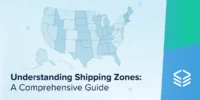There’s manufacturing terminology that’s familiar to supply chain and warehouse personnel, but still semi-foreign to consumers and even some retailers. For example, the latter may ask, what is dunnage? In simplified terms, dunnage is the packing materials used to protect goods and fragile freight when shipped. There are multiple types of dunnage including:
- Bubble wrap. Fragile items are most commonly wrapped in bubble wrap. This dunnage can be reused as long as the bubbles remain intact and still provide enough cushion. Sensitive cargo needs to be wrapped in several layers to avoid damage from the shipping container.
- Air pillows. This type of dunnage is used to fit in between items to keep them from sliding and hitting the sides. For boxes that aren’t filled with products, air pillows help to fill void space and keep things secure.
- Packing peanuts. Styrofoam peanuts are less used than other types of dunnage due to their negative effect on the environment and the inconvenience of needing a lot to ship very little.
- Foam sheets. Styrofoam sheets are still commonly used to secure the ends of televisions and other big electronics to avoid nicks and cracks, as well as to help slide items out of the box upon delivery.
- Corrugated paper. People who want to move away from the use of styrofoam often find corrugated paper a good alternative. It’s sustainable and protects well against moisture.
- Steel. As one of the most expensive dunnage options, steel is reserved for heavier products to protect against damaging lighter products shipped in the same order. Steel is often used in custom dunnage configurations along with other forms of packaging material to ensure safe travel.
Whatever helps keep products secure and undamaged during transport is considered dunnage. Without it, products move loosely around once they’ve been sealed for shipment and have a higher chance of damage by the time it reaches a customer’s front door. The shipping label should also be covered in tape or laminated to ensure that it won’t be ripped. In fact, many people ask the question “What Is A Shipping Label?” For additional information, be sure to check out our blog article.
Why Use Dunnage?
Certain items like pillows or blankets use their own cushioning and don’t require the same kind of packing materials as items that could be easily damaged like electronics or furniture. Deciding which dunnage to use and how to pack shipments is an important part of quality assurance.
So, why is dunnage necessary? There are two main reasons dunnage is used. It protects products from moisture and serves as shock absorption to allow products to arrive fully intact. Regardless of whether you send a single shipment or a split shipment, all items need to be protected.
Moisture Protection
From the time an order is placed online until the time it’s delivered to a customer’s preferred address, items go through various temperature changes and may be subject to inclement weather. Using packaging material to protect from moisture is an important part of choosing a dunnage option.
Rainy or snowy days can change the integrity of shipping boxes and leak into the inside of the package leading to ruined items and unhappy customers. For example, think about if you’re shipping books and the moisture seeps into the pages. It will warp the edges, if not ruin the books altogether. Protecting products with dunnage like bubble wrap keeps moisture out and items intact.
Shock Absorption
Another main reason why dunnage is used is for shock absorption. Items that crash into each other during transport can crack or break, causing a damaged shipment. When shipping candles or picture frames, for example, the glass containers can’t be left loose to roll around. Cardboard inserts or tightly wrapped plastic must cushion each fragile item to prevent impact when boxes are jostled during shipment and delivery.
Dunnage for shock absorption is necessary even for items that are unbreakable. It prevents unnecessary wear and tear on the box, which can split open if there are items puncturing the sides.
Delivering Items Fully Intact for Better Customer Satisfaction
When partnering with a company that provides e-commerce fulfillment services you’ll want to ask if they provide dunnage as part of their operations or their process for packaging your goods. The reason is because once you’ve released items to be packaged and shipped, you’re relying on warehouse workers to maintain the integrity of your products during the merchandise fulfillment. When the customer receives the package on the other end, they’ll want to receive it in pristine condition.
Any concerns with product damage or delays will be directed to your company rather than the warehouse or 3PL itself. Retailers are the ones held responsible for customer service, returns, and questions regarding how their items arrived. Keeping products safe and secure during transit is crucial and can negatively impact your business if changes aren’t made right away.
By monitoring responses from your audience base, you can also decide if you need to change the packing material used when packaging goods. Many consumers have focused on environmentally-friendly brands that take measures to be as sustainable as possible.
Plan a custom dunnage solution based on the types of goods you’re selling and your customer base. Decide how you want to budget packing materials and what makes most sense for your goods. At Flowspace, we offer premium shipping options for all of your shipping needs.
For additional information on how Flowspace can help your business grow, submit a quote today!





